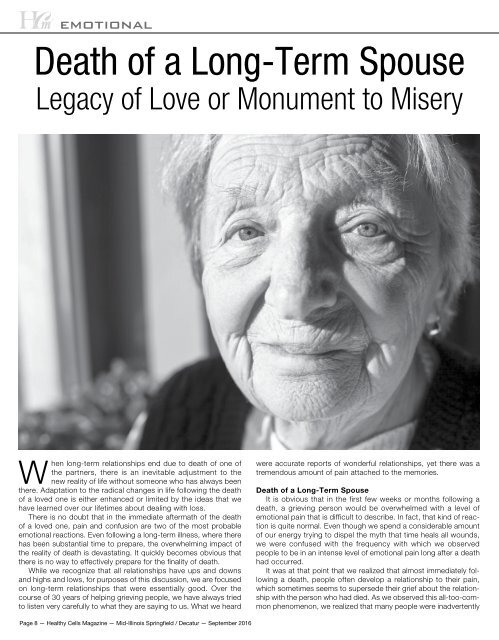You also want an ePaper? Increase the reach of your titles
YUMPU automatically turns print PDFs into web optimized ePapers that Google loves.
emotional<br />
Death of a Long-Term Spouse<br />
Legacy of Love or Monument to Misery<br />
When long-term relationships end due to death of one of<br />
the partners, there is an inevitable adjustment to the<br />
new reality of life without someone who has always been<br />
there. Adaptation to the radical changes in life following the death<br />
of a loved one is either enhanced or limited by the ideas that we<br />
have learned over our lifetimes about dealing with loss.<br />
There is no doubt that in the immediate aftermath of the death<br />
of a loved one, pain and confusion are two of the most probable<br />
emotional reactions. Even following a long-term illness, where there<br />
has been substantial time to prepare, the overwhelming impact of<br />
the reality of death is devastating. It quickly becomes obvious that<br />
there is no way to effectively prepare for the finality of death.<br />
While we recognize that all relationships have ups and downs<br />
and highs and lows, for purposes of this discussion, we are focused<br />
on long-term relationships that were essentially good. Over the<br />
course of 30 years of helping grieving people, we have always tried<br />
to listen very carefully to what they are saying to us. What we heard<br />
were accurate reports of wonderful relationships, yet there was a<br />
tremendous amount of pain attached to the memories.<br />
Death of a Long-Term Spouse<br />
It is obvious that in the first few weeks or months following a<br />
death, a grieving person would be overwhelmed with a level of<br />
emotional pain that is difficult to describe. In fact, that kind of reaction<br />
is quite normal. Even though we spend a considerable amount<br />
of our energy trying to dispel the myth that time heals all wounds,<br />
we were confused with the frequency with which we observed<br />
people to be in an intense level of emotional pain long after a death<br />
had occurred.<br />
It was at that point that we realized that almost immediately following<br />
a death, people often develop a relationship to their pain,<br />
which sometimes seems to supersede their grief about the relationship<br />
with the person who had died. As we observed this all-too-common<br />
phenomenon, we realized that many people were inadvertently<br />
Page 8 — Healthy Cells Magazine — Mid-Illinois <strong>Springfield</strong> / Decatur — September 2016


